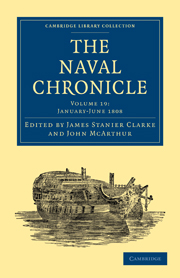 The Naval Chronicle
The Naval Chronicle Book contents
- Frontmatter
- PLATES IN VOLUME XIX. From Original Designs
- PREFACE TO THE NINETEENTH VOLUME
- BIOGRAPHICAL MEMOIR OF CAPTAIN JOSEPH ELLISON, OF THE ROYAL NAVY
- BIOGRAPHICAL MEMOIR OF THE LATE SIR CHARLES HARDY, KNT. ADMIRAL OF THE WHITE SQUADRON, GOVERNOR OF GREENWICH HOSPITAL, &C
- BIOGRAPHICAL MEMOIR OF CAPTAIN EDWARD BULLER, OF THE ROYAL NAVY
- BIOGRAPHICAL MEMOIR OF THE LATE JOHN MACBRIDE, ESQ. ADMIRAL OF THE BLUE SQUADRON
- BIOGRAPHICAL MEMOIR OF JOHN HOLLOWAY, ESQ. VICE-ADMIRAL OF THE RED, GOVERNOR OF THE ISLAND OF NEWFOUNDLAND, AND COMMANDER IN CHIEF ON THAT STATION
- BIOGRAPHICAL MEMOIR OF THE LATE CAPTAIN CHARLES LYDIARD, OF THE ROYAL NAVY
- INDEX
BIOGRAPHICAL MEMOIR OF JOHN HOLLOWAY, ESQ. VICE-ADMIRAL OF THE RED, GOVERNOR OF THE ISLAND OF NEWFOUNDLAND, AND COMMANDER IN CHIEF ON THAT STATION
Published online by Cambridge University Press: 10 January 2011
- Frontmatter
- PLATES IN VOLUME XIX. From Original Designs
- PREFACE TO THE NINETEENTH VOLUME
- BIOGRAPHICAL MEMOIR OF CAPTAIN JOSEPH ELLISON, OF THE ROYAL NAVY
- BIOGRAPHICAL MEMOIR OF THE LATE SIR CHARLES HARDY, KNT. ADMIRAL OF THE WHITE SQUADRON, GOVERNOR OF GREENWICH HOSPITAL, &C
- BIOGRAPHICAL MEMOIR OF CAPTAIN EDWARD BULLER, OF THE ROYAL NAVY
- BIOGRAPHICAL MEMOIR OF THE LATE JOHN MACBRIDE, ESQ. ADMIRAL OF THE BLUE SQUADRON
- BIOGRAPHICAL MEMOIR OF JOHN HOLLOWAY, ESQ. VICE-ADMIRAL OF THE RED, GOVERNOR OF THE ISLAND OF NEWFOUNDLAND, AND COMMANDER IN CHIEF ON THAT STATION
- BIOGRAPHICAL MEMOIR OF THE LATE CAPTAIN CHARLES LYDIARD, OF THE ROYAL NAVY
- INDEX
Summary
“An honest Man's the noblest work of God.”
—PopeIf ever any one deserved, that high character, without any fulsome compliment, it is the subject of the following memoir: who after having been placed in very delicate and arduous situations, has obtained the friendship of all who have served with him, and has kept up the discipline of the navy, without creating a single enemy.
Mr. John Holloway was born at Wells, in Somersetshire, the present residence of his family. During the year 1760, when he was about 13, he resolved to devote himself to the royal navy; and his intention being sanctioned by his father, and recommended by Mr. James Grenville, he was sent on board the Antelope, of 50 guns, Captain Webb, and afterwards, in 1761, sailed in her to Newfoundland, with Captain, the late Lord Graves; who had been appointed governor of the island, and commander in chief on that station. Mr. Holloway then served for two years under Sir Hugh Palliser; and also, with a view of promotion, embarked with Admiral Durell, appointed commander in chief at Halifax: but that officer dying soon after his arrival in America, Mr. Holloway was, in 1768, taken under the patronage of Commodore Samuel Hood, in the Romney.
During the period of Mr. Holloway's services as a midshipman, no opportunity offered to distinguish himself by any brilliant or daring exploit.
- Type
- Chapter
- Information
- The Naval ChronicleContaining a General and Biographical History of the Royal Navy of the United Kingdom with a Variety of Original Papers on Nautical Subjects, pp. 353 - 440Publisher: Cambridge University PressPrint publication year: 2010First published in: 1808


